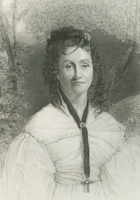Description Of Egla Poem by Maria Gowen Brooks
Description Of Egla
BLEST were those days! Can these dull ages boast
Aught to compare? though now no more beguile,
Chain'd in their darkling depths, the infernal host;
Who would not brave a fiend to share an angel's smile?
'T was then there lived a captive Hebrew pair;
In woe the embraces of their youth had past;
And blest their paler years one daughter; fair
She flourish'd, like a lonely rose, the last
And loveliest of her line. The tear of joy,
The early love of song, the sigh that broke
From her young lip, the best beloved employ;
What womanhood disclosed, in infancy bespoke
A child of passion: tenderest and best
Of all that heart has inly loved and felt,
Adorned the fair enclosure of her breast:
Where passion is not found, no virtue ever dwelt.
Yet, not perverted, would my words imply
The impulse given by Heaven's great Artisan
Alike to man and worm, mere spring, whereby
The distant wheels of life, while time endures, roll on:
But the collective attributes that fill,
About the soul, their all-important place;
That feed her fires, empower her fainting will,
And write the God on feeble mortal's face.
Yet anger or revenge, envy or hate,
The damsel knew not: when her bosom burned
And injury darken'd the decrees of fate,
She had more piteous sigh'd to see that pain return'd.
Or if, perchance, though form'd most just and pure
Amid their virtue's wild luxuriance hid,
Such germs, all mortal bosoms must immure
Which sometimes show their poisonous heads, unbid, —
If, haply such the fair Judean finds,
Self-knowledge wept the abasing truth to know;
And innate Pride, that queen of noble minds,
Crushed them indignant ere a bud could grow.
And such, even now, in earliest youth are seen;
But would they live, with armour more deform
Their breasts made soft by too much love must screen: —
'The bird that sweetest sings can least endure the storm.
And yet, despite of all, the starting tear,
The melting tone, the blood suffusive, proved,
The soul that in them spoke could spurn at fear
Of death or danger; and had those she loved
Required it at their need, she could have stood,
Unmoved, as some fair-sculptured statue, while
The dome that guards it earth's convulsions rude
Are shivering, meeting ruin with a smile.
And this at intervals in language bright
Told her blue eyes; though oft the tender lid
Droop'd like a noon-day lily, languid, white,
And trembling, all save love and lustre hid;
Then, as young christian bard had sung, they seem'd
Like some Madonna in his soul, so sainted;
But opening in their energy they beam'd
As tasteful Grecians their Minerva painted;
While o'er her graceful shoulder's milky swell,
Silky as those on little children seen,
Yet thick as Indian fleece her ringlets fell,
Nor owned Pactolus' sands a brighter sheen.
This poem has not been translated into any other language yet.
I would like to translate this poem